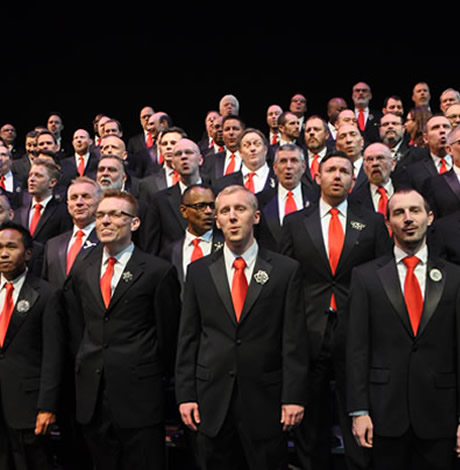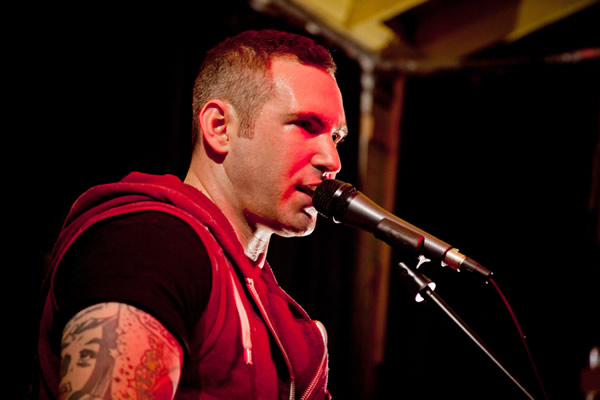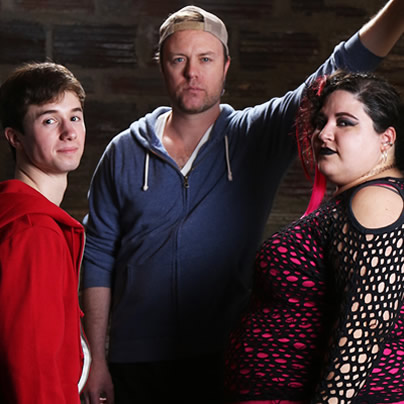Arts & Entertainment
Trials and tribulations
Ford’s takes chance on daring musical ‘Parade’
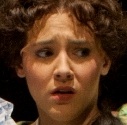
‘Parade’
Through Oct. 30
Ford’s Theatre
511 1oth Street, NW
$15-$75
fords.org
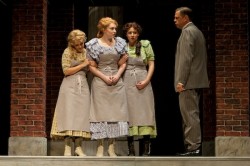
From left, Erin Driscoll, Bligh Voth and Carolyn Agan as the young factory girls and Stephen F. Schmidt as Governor Slayton in the Ford’s Theatre production of the musical drama ‘Parade,’ directed by Stephen Rayne. (Photo by T. Charles Erickson; courtesy Ford’s Theatre)
Not all musicals end happily. Case in point: “Parade.” Based on the real life trial and lynching of Leo Frank in early 20th century Atlanta, the Tony Award winner (currently playing at Ford’s Theatre) is some depressing stuff.
Yes, Jason Robert Brown’s gorgeous score softens the grim facts and when sung by the talented actors gathered for this respectable production, the show remains a sad story, but one that’s beautifully told.
It’s 1913 and the bloody body of 13-year-old Mary Phagan (Lauren Williams) is found in the basement of Atlanta’s National Pencil factory on Confederate Memorial Day. Following a mishandled investigation, Frank (Euan Morton), a young Brooklyn Jew who has moved south to marry nice Jewish girl Lucille (Jenny Fellner) and run the factory, is arrested for the murder of his young employee.
Atlanta’s citizenry is out for blood. A lingering resentment of Northerners (it’s just 50 years since the Civil War) combined with a heavy dose of anti-Semitism are the prefect recipe for injustice. One by one, the coached and coerced give damning testimony in a mostly sung-through trial sequence whose high point is the sensational “That’s What He Said” in which slippery witness James Conley (Kevin McAllister) backed by the ensemble set the stage for Frank’s railroading.
Fellner sings a heartrending rendition of “You Don’t Know This Man,” Lucille’s balladic defense of her husband. Similarly, Morton as Leo (an uptight adding machine so unfamiliar with southern ways) begins to open up with “It’s Hard to Speak My Heart.” But despite the couple’s best efforts, their foes — ambitious prosecuting attorney Hugh Dorsey (James Konicek) and rabble-rousing publisher Tom Watson played by a mustachioed Will Gartshore (local gay actor whose glorious tenor was also heard in “Parade” when it opened on Broadway in 1998, but in a different part) — aren’t listening.
Morton, the versatile Scottish actor who became well known for playing Boy George in Broadway’s musical “Taboo,” is terrific. His Leo is at turns nebbishy, brusque, slightly superior, but in the end loving. Unfortunately neither Brown’s score nor the show’s book by Alfred Uhry (who also wrote “Driving Miss Daisy,” another peek into Atlanta’s Jewish community) provides an opportunity for Leo to reveal his fear and anguish.
The heart of the story is Leo and Lucille’s changing marriage. What starts out as a loveless seemingly arranged union forges into a respectful partnership as the pair work to secure Leo’s freedom and ultimately blossoms into full blown romance. Jailhouse visits are breezy. Lucille sets out her finicky husband’s home cooked favorites while Leo busily works on his appeal. If only for a short time, they behave like a happily married couple despite the macabre circumstance.
Conducted by Steven Landau, Brown’s soaring score references military marches, spirituals and waltzes. There are sad ballads and grave melodies aplenty, but a few tunes encourage toe tapping too. It’s those along with choreographer Karma Camp’s cake-walking moves that remind us of the circus like good time surrounding Leo’s trial and lynching. They were big entertainment, the hottest tickets in town.
Sure-handedly staged by Stephen Rayne, the production moves at a good clip. Set designer Tony Cisek imagines the newly industrialized Atlanta as two tiers of red brick arches that serve variously as factory, courthouse, jail, governor’s mansion and the Frank home. Two towering columns – each in unchecked stages of decay — stand as fading remnants of a prouder, more glorious South. And Wade Laboissonniere’s many period costumes are spot on and superbly rendered.
There’s a lingering sadness to Ford’s “Parade.” Long after the actors have taken their bows, we’re haunted by the ghosts of little Mary Phagan, Leo Frank, his wife and the people of Atlanta. Neither they nor the tragic events are easily forgotten.
Books
‘Pronoun Trouble’ reminds us that punctuation matters
‘They’ has been a shape-shifter for more than 700 years

‘Pronoun Trouble’
By John McWhorter
c.2025, Avery
$28/240 pages
Punctuation matters.
It’s tempting to skip a period at the end of a sentence Tempting to overuse exclamation points!!! very tempting to MeSs with capital letters. Dont use apostrophes. Ask a question and ignore the proper punctuation commas or question marks because seriously who cares. So guess what? Someone does, punctuation really matters, and as you’ll see in “Pronoun Trouble” by John McWhorter, so do other parts of our language.

Conversation is an odd thing. It’s spontaneous, it ebbs and flows, and it’s often inferred. Take, for instance, if you talk about him. Chances are, everyone in the conversation knows who him is. Or he. That guy there.
That’s the handy part about pronouns. Says McWhorter, pronouns “function as shorthand” for whomever we’re discussing or referring to. They’re “part of our hardwiring,” they’re found in all languages, and they’ve been around for centuries.
And, yes, pronouns are fluid.
For example, there’s the first-person pronoun, I as in me and there we go again. The singular I solely affects what comes afterward. You say “he-she IS,” and “they-you ARE” but I am. From “Black English,” I has also morphed into the perfectly acceptable Ima, shorthand for “I am going to.” Mind blown.
If you love Shakespeare, you may’ve noticed that he uses both thou and you in his plays. The former was once left to commoners and lower classes, while the latter was for people of high status or less formal situations. From you, we get y’all, yeet, ya, you-uns, and yinz. We also get “you guys,” which may have nothing to do with guys.
We and us are warmer in tone because of the inclusion implied. She is often casually used to imply cars, boats, and – warmly or not – gay men, in certain settings. It “lacks personhood,” and to use it in reference to a human is “barbarity.”
And yes, though it can sometimes be confusing to modern speakers, the singular word “they” has been a “shape-shifter” for more than 700 years.
Your high school English teacher would be proud of you, if you pick up “Pronoun Trouble.” Sadly, though, you might need her again to make sense of big parts of this book: What you’ll find here is a delightful romp through language, but it’s also very erudite.
Author John McWhorter invites readers along to conjugate verbs, and doing so will take you back to ancient literature, on a fascinating journey that’s perfect for word nerds and anyone who loves language. You’ll likely find a bit of controversy here or there on various entries, but you’ll also find humor and pop culture, an explanation for why zie never took off, and assurance that the whole flap over strictly-gendered pronouns is nothing but overblown protestation. Readers who have opinions will like that.
Still, if you just want the pronoun you want, a little between-the-lines looking is necessary here, so beware. “Pronoun Trouble” is perfect for linguists, writers, and those who love to play with words but for most readers, it’s a different kind of book, period.
The Blade may receive commissions from qualifying purchases made via this post.

Friday, April 18
“Center Aging Friday Tea Time” will be at 2 p.m. on Zoom. This is a social hour for older LGBTQ+ adults. Guests are encouraged to bring a beverage of choice. For more details, email [email protected].
Go Gay DC will host “LGBTQ+ Community Social in the City” at 7 p.m. at Hotel Zena. This event is ideal for making new friends, professional networking, idea-sharing, and community building. This event is free and more details are available on Eventbrite.
Trans and Genderqueer Game Night will be at 6 p.m. at the DC Center for the LGBT Community. This will be a relaxing, laid-back evening of games and fun. All are welcome and there’ll be card and board games on hand. Feel free to bring your own games to share. For more details, visit the DC Center’s website.
Saturday, April 19
Go Gay DC will host “LGBTQ+ Community Brunch” at 11 a.m. at Freddie’s Beach Bar & Restaurant. This fun weekly event brings the DMV area LGBTQ+ community, including Allies, together for delicious food and conversation. Attendance is free and more details are available on Eventbrite.
LGBTQ People of Color Support Group will be at 7 p.m. on Zoom. This peer support group is an outlet for LGBTQ People of Color to come together and talk about anything affecting them in a space that strives to be safe and judgement free. There are all sorts of activities like watching movies, poetry events, storytelling, and just hanging out with others. For more information and events for LGBTQ People of Color, visit thedccenter.org/poc or facebook.com/centerpoc.
“Spark Sapphic Social” will be at 8 p.m. at Spark Social House. This weekly sapphic social is an opportunity to mix and mingle with other sapphics in D.C.’s newest LGBTQ bar. This event is free and more details are available on Eventbrite.
“DC Drag Brunch on Rooftop – Penthouse (Formerly at Lima Twist)” will be at 12 p.m. at Baby Shank Rooftop. Hosted by Miss Capital Pride, this is the ultimate drag brunch experience in Washington, D.C., featuring the fiercest queens around. Prepare to be entertained by glamorous drag queens and celebrated celebrity impersonators, including Taylor Swift, Lady Gaga, Beyoncé, Britney Spears, Nicki Minaj, Ariana Grande, Whitney Houston, Cher and many more. Tickets cost $27 and are available on Eventbrite.
Sunday, April 20
Queer Crayon Club will host “Queer Sketch Social” at 3 p.m. at Sinners and Saints. This is a fun event for LGBTQ+ adults to come together and color. Attendance is free and more details are available on Eventbrite.
Monday, April 21
“Center Aging Monday Coffee & Conversation” will be at 10 a.m. on Zoom. This is a social hour for older LGBTQ+ adults. Guests are encouraged to bring a beverage of choice. For more details, email [email protected].
Tuesday, April 22
Genderqueer DC will be at 7 p.m. on Zoom. This support group is for people who identify outside of the gender binary. Whether you’re bigender, agender, genderfluid, or just know that you’re not 100% cis – this is your group. For more details, visit www.genderqueerdc.org or Facebook.
Coming Out Discussion Group will be at 7 p.m. on Zoom. This is a peer-facilitated discussion group and a safe space to share experiences about coming out and discuss topics as it relates to doing so. For more details, visit the group’s Facebook.
Wednesday, April 23
Job Club will be at 6 p.m. on Zoom. This is a weekly job support program to help job entrants and seekers, including the long-term unemployed, improve self-confidence, motivation, resilience and productivity for effective job searches and networking — allowing participants to move away from being merely “applicants” toward being “candidates.” For more information, email [email protected] or visit thedccenter.org/careers.
Asexual and Aromantic Discussion Group will be at 7 p.m. on Zoom. This is a space where people who are questioning this aspect of their identity or those who identify as asexual and/or aromantic can come together, share stories and experiences, and discuss various topics. For more details, email [email protected].
Thursday, April 24
Virtual Yoga with Sarah M. will be at 7 p.m. on Zoom. This is a free weekly class focusing on yoga, breath work, and meditation. For more details, visit the DC Center for the LGBT Community’s website.
DC Anti-Violence Project Open Meeting will be at 7 p.m. on Zoom. This meeting is open to anyone interested in learning more and getting involved in lessening violence both within and directed towards the LGBT communities. For more information, visit Facebook or Twitter.
Movies
Heartfelt ‘Wedding Banquet’ remake a romcom worth seeing
Mishaps, crossed wires, conflicts are all part of the fun
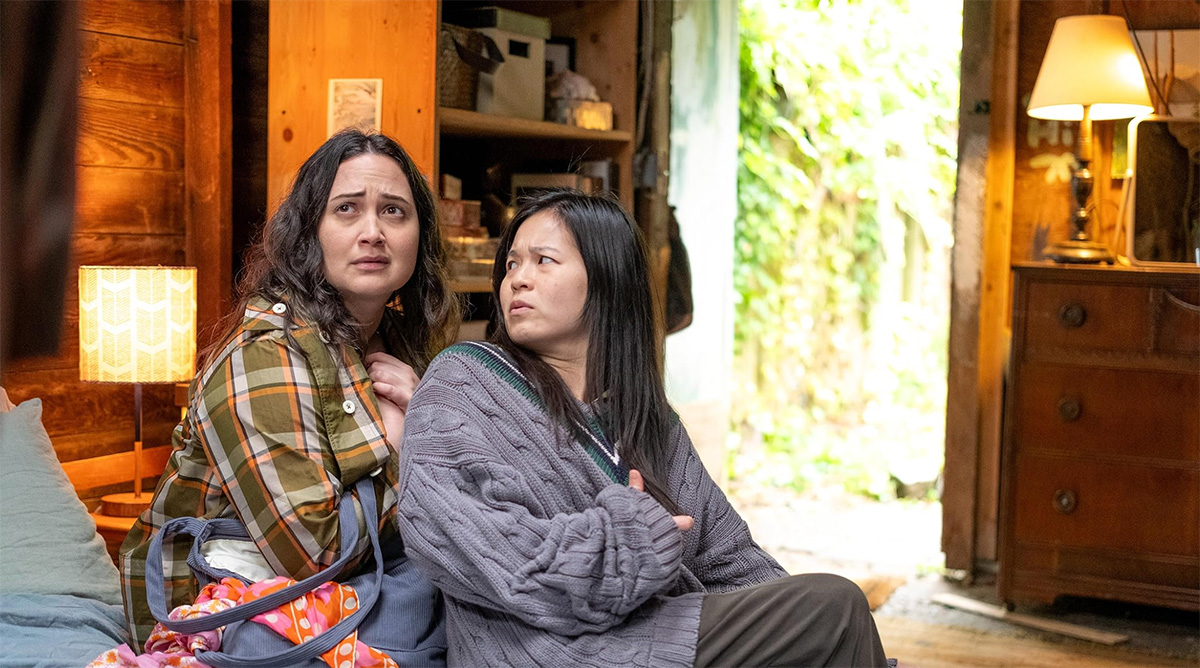
Creating a worthy remake can be a tricky proposition, especially when the movie being remade is a beloved classic – but that doesn’t mean it’s an impossible one.
Consider Andrew Ahn’s new version of 1993’s “The Wedding Banquet,” a film that put future “Brokeback Mountain” director Ang Lee on the proverbial map in America, which opens in theaters this weekend after a debut at Sundance earlier this year. The original, an American/Taiwanese production which became a surprise hit in the U.S., broke ground with its story — a culture-clash comedy of manners about a queer romantic triangle attempting to stage a sham wedding, it was quickly embraced by LGBTQ audiences thrilled to see representation on the big screen and positive representation, at that, in an era when it was even scarcer than it is today. To undertake a remake of such a film is a bold move, to say the least.
Yet gay Korean American writer/director Ahn (“Spa Night,” “Fire Island”) – has built his blossoming career on films about queer relationships among Asian American characters, with as much (or more) emphasis on family, both biological and chosen, as on romantic partnership; It seems natural, perhaps, for him to reinterpret this influential classic through his own lens, and he’s already proven himself as a filmmaker whose strengths line up perfectly with the material.
Even so, Ahn hedges his bets, perhaps, by collaborating on the new screenplay with James Schamus, who also co-wrote the original (along with Lee and Neil Peng), and the result is a movie that – although it recrafts the original romcom for a newer age and reconfigures its central relationships a bit to “up the ante” on its complications – stays relatively faithful to the broad strokes of its plot.
In this iteration, the New York setting is transposed to Seattle, and the plot revolves around not just one queer romance, but two: Chris and Min (Bowen Yang and Han Gi-Chan), a stalled grad student and his South Korean boyfriend, and their lesbian friends-and-landladies Lee and Angela (Lily Gladstone and Kelly Marie Tran), who are struggling to become parents through expensive IVF treatments. Min, an artist whose temporary visa is about to expire, wants to stay with Chris and build a life in America, but his grandmother (Youn Yuh-jung) – currently running the vast family business empire to which he is heir – wants him to come home and claim his place in the organization. A wedding to Chris would secure him the green card he needs to defy his grandmother’s demands, but it would also mean outing himself as gay and potentially being cut off from his inheritance. As a solution, he offers to pay for Lee and Angela’s fertilization procedure in exchange for a “green card wedding” with the latter, ensuring that he can remain in the U.S. while also remaining in the closet to his family.
Of course it’s an idea as bad as it sounds, but despite some reticence, the couples agree to the plan; but when grandmother decides to come to America and meet the bride in person, the four of them must attempt to pull off a masquerade that escalates far beyond their expectations after she insists on putting on a traditional – and elaborate – Korean wedding worthy of her grandson’s exalted status, all while wrestling with the ambivalence and doubts that begin to encroach on their relationships as the scheme begins to fray at the edges.
Those who’ve seen the original already know that things don’t play out exactly as planned – and anyone who hasn’t won’t be surprised when it doesn’t, anyway. We already told you it was a bad idea.
That, of course, is the charm of the romcom, a genre in which mishaps, crossed wires and conflicts are all part of the fun, and in any case it gives Ahn’s film the opportunity to explore – as Lee did with the original – the more serious and relatable challenges of reconciling our queerness with the deeply ingrained traditions of our cultural background; he does so with gentle wit and an equal measure of respect, but he’s not above getting laughs by pointing up the sheer absurdity that sometimes goes along with the process. Neither does he hesitate to delve into the messiness of queer relationships, even (and perhaps especially) with lifelong friends, or the deep insecurities and self-criticisms which get in the way of sorting them out.
To these ends, “Wedding Banquet” relies heavily on its cast, who embrace and clearly relish the chance to flesh out these characters. Yang brings his inevitable “SNL” star power to the table but downplays the wackiness in favor of a more nuanced tone, and Gi-Chan shines as his pragmatically idealistic partner; Gladstone’s intelligence and authenticity is a grounding force, while Tran counterpoints her with an eminently likable turn as her spunky-but-anxious misfit of a girlfriend – and the resonance they each bring to the prospect of motherhood highlights the longing for family and legacy that so many queer couples carry as they build their lives together.
It’s not all about the couples, though. Veteran Chinese American actress Joan Chen (“Tai Pan,” “Twin Peaks”) is a scene stealer as Angela’s hyper-supportive mom, whose participation in her daughter’s “lavender wedding” requires her to go against her deepest instincts as a proud ally, and Bobo Le provides a further connection to the theme of family with a charming performance as Yang’s tomboy-ish little sister. The anchoring performance, however, comes from acclaimed Korean star Yuh-jong, whose shrewd, savvy, and staunch portrayal of Gi-Chan’s power player grandma adds a much-needed dose of level-headed wisdom into the midst of the whirlwind.
In the end, Ahn’s update of Lee’s classic comedy scores big points for honoring the original’s message of acceptance and embracing the notion of reimagining our ideas of traditional family structures to meet the needs of an ever-changing world; it also succeeds in maintaining a heartfelt sense of empathy for each of its characters, all of whom appeal to us precisely because of their imperfections and their hangups. None of them are perfect, but all of them are perfectly human, which goes a long way toward making Ahn’s remake feel like more than just the slickly-made feel-good romcom it resembles.
And yet, given the screwball potential and the endless possibilities for farcical developments in the convoluted deception attempted by its sets of lovers, Ahn’s “Wedding Banquet” could have been funnier. Leaning into an idealized and sentimental perspective as it gracefully brings its characters’ lives into place, it occasionally feels a bit “precious,” too “Hollywood” to be believed.
Again, however, this is part of the charm of the romcom: if generations of straight audiences have gotten the chance to buy into idealized big screen fantasies about life and love, then why shouldn’t we enjoy the same privilege?
With that in mind, “The Wedding Banquet” makes for a perfect opportunity to entertain and validate ourselves – and even if it doesn’t tickle your funny bone, it’s a generous enough feast for your queer soul that it deserves you to see it.
Just make sure you bring somebody special to share your popcorn with.
-

 El Salvador3 days ago
El Salvador3 days agoGay Venezuelan makeup artist remains in El Salvador mega prison
-

 District of Columbia5 days ago
District of Columbia5 days agoReenactment of 1965 gay rights protest at White House set for April 17
-

 State Department2 days ago
State Department2 days agoHIV/AIDS activists protest at State Department, demand full PEPFAR funding restoration
-

 Opinions4 days ago
Opinions4 days agoScience must not be a weapon against trans people

